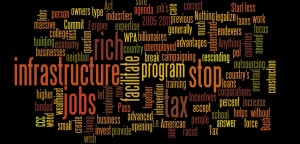Author Archives: Alexander Tucciarone
The Great Recession and You: A Survey
The jobs crisis continues undermining the economic recovery of the United States, with unemployment currently at 9 percent. A particularly troubling part of this downturn has been the swollen ranks of the long-term unemployed. According to a recent study by the Pew Charitable Trusts, about 32 percent of unemployed Americans have been without work for more than a year.
In a survey I conducted of 28 people through various social networking sites, namely Facebook and Twitter, I asked a random sampling of people about the way the jobs crisis has touched their lives. The polling sample was far from scientific, but revealed some compelling anecdotal insight into the fact that very few people have escaped the jobs crisis unscathed.
What is the longest period of time for which you have been involuntarily unemployed?
At the end of the survey, I asked all the participants what they believe the federal government can do to address the jobs crisis. Responses ranged from “Nothing” to “Tax billionaires more” to “Create a CCC type New Deal program.” No consensus was reached, but the most frequently mentioned remedy was the government investing more in infrastructure.
The varied responses are illustrated below in a Word Cloud.
Halloween and Coming to America
Rita’s family emigrated to the United States from Kharkov, USSR when she was three-years-old, hoping for a better life. Twenty years later her father is a successful IT expert, her mother is a renowned match-maker in Brooklyn’s Jewish community, her sister is a Wall Street attorney, and Rita is a rising star in the NYC fashion scene.
For her and many other immigrants, coming to master Halloween has been a big part of their assimilating to American life. She talks about this experience here.
Cranberry Country Comes to Midtown
Take 16,000 square feet, 2000 pounds of cranberries, twenty laborers, twelve hours of working, and throw them all together. Shake well. The result? OceanSpray’s seventh annual cranberry bog in Rockefeller Plaza.

Each year OceanSpray teams up with marketing companies Arnold Worldwide and Webber Shanwick to set up cranberry bogs across the country. The even began in Manhattan seven years ago and has since spread to Los Angeles, Chicago, and Boston.
“It’s a stunning harvest that stops you in your tracks,” said Cindy Taccini, spokeswoman for OceanSpray. “Some people aren’t as lucky to live in cranberry country, so we bring the bog to them.”
Cranberries are harvested mainly in the Northeast and Northwest of the United States. OceanSpray is a cooperative of seven hundred cranberry farmers with headquarters in Lakeville, Massachusetts. To convey the organization’s New England roots, Arnold Worldwide brought in antique farming equipment and several decorative plants indigenous to the northeastern US.
“We really wanted the whole setup to feel in harmony and for the cranberry environment to come across 360 degrees,” said John Raftery, director of brand experience at Arnold Worldwide.
The two-day event included several activities, including a raffle with a prize of eating in a pop-up restaurant erected in the bog. Hundreds of contestants entered for the twenty-five spots in the bog.
Some controversy erupted when the event organizers changed the raffle rules last minute. They dropped the requirement that raffle ticket holders had to be present when their named was called, giving groups a chance to phone their friends and invite them back to a spot in the pop-up restaurant.
“I really don’t think it’s fair because I’ve been waiting since 11 AM, and some of these people are just showing up and winning,” said Alberta Duperval, a home health aide in Manhattan.
The atmosphere was joyful overall, with raffle winners putting on their waders and standing in the bog with cranberries up to their knees, eating Asian fusion dishes by celebrity chef Ming Tsai. The food and non-alcoholic drinks served all contained cranberries in some way.
OceanSpray declined to reveal the cost of the bog’s set-up, with spokeswoman Taccini insisting the price tag was not important. “It’s worth it to us enough that we are showcasing this for the seventh time here in Rockefeller Plaza.”
The Tucciarone Family Reunion
Gallery
On October 15, 2011, the Tucciarone family held their first family reunion in Edgewater, New Jersey. The Tucciarone family first arrived to the United States in the early 1900s. They were originally from Minturno, Italy, an ancient village about an … Continue reading
The Jobs Crisis Started Long Before 2008
U.S. Census Bureau figures coming out earlier this week confirmed what the majority of Americans see every day; poverty is one the rise across the country. According to the report, 1 in 6 Americans is now living in poverty. This is the highest level since the downturn of the early 1990s. On a technical level, the recession that began with the collapse of the housing market and the ensuing financial meltdown concluded years ago. For the estimated 24 million Americans who are unemployed or underemployed, the crisis never came to an end.
Politicians and pundits offered an unsurprising reaction. Democrats accused Republicans of smothering the recovery in its crib. Republicans accused President Obama of being in over his head. Dueling jobs plans were unveiled by the President, leading Republican presidential contenders, and House Speaker John Boehner. Taxes must be cut! Money must be spent! The back and forth that has come to define our national discourse sank its teeth into the national leadership’s reflection on the continuing jobs crisis.
Several commentators have begun pointing to the fact that policymakers are failing to acknowledge the big picture. The Brookings Institution, a leading think-tank for the center left, crunched the numbers and determined that the jobs crisis was a ticking time bomb throughout the course of the Bush administration. According to the Institution’s analysis, the downturn of the early 2000s brought about a stagnation in the job market that faded from view but continued undermining the country’s economic prospects.
Joel Berg, executive director of the NYC Coalition Against Hunger, also sought to provide a broader context for the Census Bureau’s latest poverty numbers. While acknowledging the current severity of the jobs crisis, he emphasized that this has been a systematic problem developing for decades. “This has been going on for a long time, people saw it coming, and our leaders chose to give tax cuts to billionaires,” he said.
Texas Wildfires a Perfect Storm

Emergency personnel brought the wildfires that have ravaged central Texas under control today, heading off a blaze that leveled five hundred homes and forced the evacuation of thousands in rural Bastrop County. The conflagration cut a destructive path that broke state records, serving as a potent reminder of what happens when environmental disaster meets myopic policy-making.
This year has been a scorcher even by Texan standards. Earlier today, the National Weather Service confirmed that that the last three months in Texas have seen the hottest temperatures ever recorded in American history. This heat has been accompanied by a drought that shattered state records and continues its devastation of local water supplies, costing Texas farmers and ranchers an estimated $5.2 billion this year. These factors have combined to create wildfires that reached new heights in recent days, burning down acreage approximately the size of Connecticut.

These conditions have been exacerbated through decisions made by Governor Rick Perry and the state legislature. In a session that met this past spring, the Texas legislature slashed the state Forest Service budget by 31 percent. Compounding this was even more draconian cuts to volunteer fire departments, the first responders to this sort of situation in rural areas, amounting to 75 percent of their state funding. Despite the fact that wildfires were raging across the state as they deliberated, Texas legislators pushed through severe budget cuts to the two point agencies for this exact type of crisis.

